- Home
- Raymond Benson
High Time To Kill rbb-3 Page 2
High Time To Kill rbb-3 Read online
Page 2
Dinner was a magnificent feast consisting of traditional conch chowder, peas ‘n’ rice, Bahamian lobster, Dover sole fillets simmered in white wine, cream, and mustard sauce and topped with shrimp, and pineapple spring rolls with rum crème anglaise for dessert. Helena was in heaven and Bond enjoyed watching her eat. She savored each bite, squeezing out the juices with her cheeks and tongue before chewing and swallowing. She had one of the most sensual mouths Bond had ever kissed.
Afterward they retired to the gardens to enjoy the star-filled night sky along with several other couples. Some of the men were smoking the cigars that one of the servants had passed around. To get away from the crowd, Bond and Helena walked along a dimly lit path that circled the garden and ran around the perimeter of the grounds.
Helena sighed heavily and said, “I don’t want to go back to London.”
“All good things come to an end,” Bond replied.
“Does that mean us, James?”
“Of course not,” he said, “unless you would prefer that. I don’t want to lose the best assistant I’ve ever had.”
“Do you mean that?”
“Look, Helena, you’re a wonderful girl, but you should know me by now. Entanglements can get messy, and I don’t like them. I think while we’re in London we need to tone it down. Being the sensible girl you are, I know that you’ll agree.”
They found themselves at the far end of the expansive lawn, some fifty yards from the house. A ten-foot-high stone fence separated the grounds from the street. They stood beside a toolshed and held each other.
“You’re right, James,” she said. “It’s just that sometimes I dream of a different sort of life. One that borders on the edge of fantasy. My sister in America seems to live a fairy tale existence. She has a husband who adores her and two lovely children, and they live in an area of southern California where the weather is always perfect. She’s always so incredibly happy when I speak to her that I get a little jealous.” She smiled and took his arm. “But you’re right, James. Let’s not get morose. I want to enjoy every last minute of our time here.”
He pulled her chin toward him so that he could kiss her, but her eyes widened and she gasped. “James!”
Bond whipped around to see what had startled her. A body was lying just off the path. The shadows would have completely hidden it had it not been for the moonlight reflecting off pale skin. Bond moved quickly to the corpse and saw that it was Frank, the security guard. He had been stripped of his shirt and white jacket; his throat had been cut, ear to ear. He was lying in a pool of fresh blood.
“Wait here!” he commanded. He turned and sprinted across the lawn toward the house. He heard her call behind him, “James! I’m coming with you!” as he took a shortcut over a set of stone benches surrounding a stone fountain. He ran through the gardens toward the back of the house, searching frantically for the Governor. He found the man’s wife standing beside some guests.
“Where’s your husband?” Bond asked.
Startled, the woman replied, “Why . . . I believe I saw him go upstairs to the office with one of those security men.”
Bond left abruptly, entered the house, bolted up the stairs three at a time, and ran to the open doorway. The former Governor was lying on the floor in a ghastly pool of red. Like the guard, his throat had been slit so fiercely that his head lopped at a grotesque angle. There was no one else in the room, but two distinct footprints in blood led from the body toward the door to another bloody patch on the carpet. The killer had wiped his shoes clean before leaving the office.
Others had made their way up the stairs by this time. Bond was unable to stop the Governor’s wife from glimpsing the horrid sight. She screamed loudly just as Bond pulled her away and slammed the door shut. He told one of the men to call the police and look after her, then he rushed down to the first floor. The bewildered head servant was at the foot of the stairs.
“Did you see a guard come down the stairs?” he barked.
“Yessuh!” Albert said. “He went through the kitchen.”
“Would that lead to the motor scooter you saw earlier?”
Albert nodded furiously. He ushered Bond into the kitchen, where several servants were cleaning up after the huge meal. He then led him into a corridor and pointed to a door at the end.
“That’s the servants’ entrance,” he said. “Go out of the gate and turn left. It was just down the street a bit.”
“Tell the girl I came with to wait for me,” Bond said as he went outside.
He found himself in a small parking area reserved for the servants. He ran to the open gate and peered carefully around to look at the street. Sure enough, a black man dressed in a guard’s white jacket was on an old Vespa motor scooter. He was just beginning to pull away.
“Stop!” Bond shouted. The man looked back at Bond before accelerating down the street. Bond drew his Walther PPK and fired at him but missed. His last chance was to give chase on foot.
The man was a quarter-mile ahead of him. He had turned onto Thompson Boulevard and was headed north through busy traffic.
Bond ran into the street in front of a bus traveling in the same direction. The bus driver slammed on his brakes, throwing several passengers to the floor. The bus still hit Bond hard enough to knock him to the pavement, stunning him slightly. He got up quickly, shook his body, and continued the pursuit.
The Vespa crossed Meadow Street and zipped into the entrance of St. Bernard’s Park, circling around St. Joseph’s Baptist Church. Bond jumped on the hood of a BMW and scrambled over it just in time to see the assassin slam into a street vendor’s kiosk that had been set up at the corner of the park. T-shirts and souvenirs went flying, and the angry proprietor shouted and shook his fist at the driver. The scooter then disappeared into the park.
It was darker off the main road. Bond kept running, panting heavily. Should he risk firing a shot? He could just see the taillight of the scooter some thirty feet ahead. He didn’t want to kill the man. If he had ties to the Union, it was imperative that he be taken alive. The Vespa rounded a turn and was traveling on relatively straight pavement. It could easily speed away if he didn’t stop it now. Carefully aiming the handgun at the scooter’s taillight, he fired once.
The bullet hit the back tire, sending the scooter skidding across the pavement on its side. The killer landed hard, but immediately got up and started to run with a limp. Bond pursued him across the lawn. The assassin was holding his leg as he ran—he wouldn’t go far.
He did, however, make it to the western edge of the park and ran across the road and into a residential street. Bond followed him, almost collided with a taxi, spun around, and fell. Not wasting a second, he leaped to his feet and continued the chase. He could see the killer hobbling along about thirty feet ahead.
“Stop!” Bond shouted again.
The man turned. Bond could see him holding something in his hand. A flash of light and the unmistakable sound of a shot forced Bond to roll to the ground. His hope of taking the armed man alive had diminished greatly.
When he got to his feet, Bond saw that his prey had disappeared. There were a couple of alleys, either of which he could have run into.
Bond sprinted to the comer and peered down one of them. Sure enough, he heard the sound of running feet. Bond hugged the wall and crept quickly toward the noise. He could see the man at the end of the alley, trapped in a dead end. Bond took cover behind some rubbish barrels.
“Give up!” Bond shouted. “You’re caught. Throw down your gun.”
The man turned and looked toward the voice. His eyes were wide. He fired blindly, unable to see his target. The bullet ricocheted off the alley wall.
It was now clear to Bond what had happened. The assassin had jumped the fence, killed the guard Frank, and taken his shirt and jacket. Impersonating a security man, he then persuaded the Gov-ernor to follow him inside the house. The Governor certainly wouldn’t have known all the security guards by sight.
“I’m cou
nting to three,” Bond shouted. “Throw down your gun and raise your hands. I have a clear shot at your head. I assure you that I’ll blow a hole in it.”
The man pointed his gun in the direction of the voice. From Bond’s distance it appeared to be a revolver of some kind. Another shot went off, this time piercing the garbage can next to him.
“One . . .”
The man hesitated, not sure what to do. He knew he couldn’t escape.
“Two . . .”
Then the killer did a curious thing—he smiled. There was only one thing to do that made sense to him.
“You won’t take me alive, man,” the man said in a heavy West Indian accent. Then he pointed the gun at his temple.
“No!” Bond shouted. “Don’t—”
The man pulled the trigger. The noise reverberated like a thunderclap in the close confines of the alley.
TWO
OLD RIVALS
“THE TRICK IS NOT IN the amount of force you use when you hit the ball, Mr. Bond, but in the negative force,” said Nolan Edwards, the starter at Stoke Poges Golf Club.
“Well then, it’s perfectly clear,” Bond replied with sarcasm. The ball he had just knocked ninety yards onto the putting green overshot the hole and continued to roll into the rough.
He was frustrated by his lack of progress in mastering a difficult shot. It was called “backing the ball on the green.” Pro golfers perform it successfully most of the time; formidable amateurs such as Bond found the shot elusive. He was determined to get it right, for he had always played golf with the attitude that one should incorporate new techniques and strategies to keep the game alive. This particular shot would be useful should he ever need to hit the ball into a tough pin placement. If he overshot the hole, it would roll off the green (as he had just so aptly demonstrated). However, if he could successfully put a backspin on the ball, it would roll back toward the hole and be in a perfect position for him to sink the putt. —
Bond had been on the practice green in front of the club for half an hour. He hadn’t got it right once.
Edwards, an American from Illinois and longtime Stoke Poges employee, shook his head and wrinkled his brow. “It’s a tough one, Mr. Bond. I’ve seen very few amateurs do it. To spin the ball with some kind of accuracy, what you need to do is combine swing speed, impact position, hand action, and acceleration into one smooth swing.”
“What I need is a stiff drink,” Bond said, picking up his wound three-piece Titleist ball and pocketing it.
“Any sign of Bill?” he asked.
“I believe that’s his Alfa now,” Edwards said, nodding in the direction of the starter shed, where Bill Tanner, the Chief of Staff at SIS, had just parked his red Alfa Romeo.
“Hello, James,” he said, getting out of the car and opening the trunk. “How are you, Edwards?”
“Fine, Mr. Tanner,” the starter said. Tanner pulled out the clubs and handed them to Edwards. “Mr. Bond was just practicing a very difficult shot.”
“You still trying to put a backspin on the ball, James?”
Bond nodded, unsnapping the glove from his left hand. “I’m close, Bill. Damn close.”
Tanner chuckled. “You’re taking this much too seriously, James. Come on, let’s go and get a drink. The others will be here soon.”
Bond left his bag of Callaway clubs with Edwards and walked with Tanner to the front of the clubhouse, an impressive grade-one Palladian mansion. He had joined the club in 1993. The dues were sizable, but the splendid public and private rooms of the clubhouse, the elegant dining room and fine cuisine, the attentive staff, and the golf course itself made membership a cherished luxury. Founded in 1908, the Stoke Poges Golf Club is one of the finest in England. Located in Buckinghamshire in the south of England near Eton and Windsor, the thousand-year history of the estate is just as colorful as its surroundings. Decades of established traditions complement the club-house, its ancient gardens and parkland, and its world-famous course created by Harry Shapland Colt.
Bond and Tanner entered the lobby and walked past the grand staircase, which, at the time it was built, was the largest cantilever staircase in the UK. They went through the bright and cheery Orangery and into the more subdued President’s Bar. Bond preferred the bar, as it was a room that was both elegant and masculine. There was a yellow marble fireplace, a well-stocked oak bar, and comfortable furniture with cream-colored upholstery. Trophies and wood plaques adorned the yellow walls, proclaiming the names of past captains and other vital historical facts about the park.
Bond ordered a bourbon and Tanner asked for a Black Label whisky. Tanner looked at his watch. It was still early in the day. “They should be here soon. Do you think it will rain?”
English weather in April is unpredictable. So far, the sun had managed to skirt around the hovering dark clouds.
“Probably on the back nine,” Bond prophesied. “It never fails.”
Bond had been home for two weeks. The Governor’s murder had spoiled what had begun as a delightful holiday in the Bahamas with Helena. Now that they were back at the job, their relationship was a masquerade. They tried to put the romance behind them and, as much as possible, pretend that it never occurred. So far it wasn’t working. The situation was further complicated by the fact that their affair had been a secret before the incidents in Nassau, but now a number of people at SIS knew that he had been there with his personal assistant. Bond could feel Helena’s tension when he was at the office, so he made excuses to leave or work at home. He was extremely grateful when Tanner had suggested that he take Thursday off and play a round of golf with two other SIS civil servants.
“How is your research on the Union coming?” Tanner asked.
“Must we talk shop?” Bond snapped.
“Sorry,” Tanner said. “You really do want to master that shot!”
“No, I’m sorry, Bill,” Bond said. “I’ve been on edge lately. That business with the Governor in Nassau, and the killer who blew his own brains out. . . it’s all a big mystery that I’m still trying to sort out.”
“Never mind, James, it’s all right.” He tapped his glass against Bond’s. “Cheers.” Tanner knew damn well what was really on Bond’s mind, but he had the tact not to mention it.
Two men entered the bar. Bond glanced up and grimaced. The taller of the men spotted Bond and Tanner and waved.
“Well, well!” he said. “If it isn’t James Bond and Billy Tanner!”
“Roland Marquis,” Bond said with feigned enthusiasm. “Long time.”
Group Captain Roland Marquis was blond, broad-shouldered, and very handsome. A neatly trimmed blond mustache covered his upper lip. His eyes were a cold blue. He had the kind of weather-beaten face that suggested years of outdoor activity, and the square jaw of a matinee idol. He was the same age as Bond and just as fit.
He held out his hand as he approached their table. Marquis squeezed Bond’s hand roughly, reminding 007 of their lifelong rivalry.
“How are you. Bond?” Marquis asked.
“Fine. Keeping busy.”
“Really? I would have thought there’s not a lot to do over at SIS these days, eh?” Marquis sniffed.
“We have plenty to do,” Bond said with little humor. “Mostly cleaning up messes left by others. How about you? The RAF still treating you better than you deserve?”
Marquis laughed. “The RAF treats me like a bloody king.”
The other man stepped up to the table. A man in his late thirties, he was smaller in stature, thin, and had glasses, a long nose, and bushy eyebrows, all of which gave him a birdlike appearance.
“This is my partner, Dr. Steven Harding,” Marquis said. “He’s with the Defence Evaluation and Research Agency. Dr. Harding, I present you James Bond and Bill Tanner. They work for the Ministry of Defence, in that gaudy building next to the Thames.”
“SIS? Really? How do you do!” Harding held out his hand. Both men shook hands with him.
“Join us for a drink?” Tanner asked.
“We’re just waiting for our friends to make up the fourball.”
Marquis and Harding pulled up chairs. “Bill, I haven’t met your new chief,” Marquis said. “What’s she like?”
“She runs a very tight ship,” Tanner replied. “Things are not that different since Sir Miles retired. What about you? I think the last time we spoke you were working at Oakhanger?”
I’ve moved,” Marquis said. “They’ve got me liaising with the DERA now. Dr. Harding here is one of their top engineers in the aeronautics division. Almost everything he does is classified.”
“Well, you can tell us. We won’t say a word,” Bond said.
“You’ll hear about it soon enough, I should think. Won’t they, doctor?”
Harding was in the middle of taking a sip from a gin and tonic. “Hmmm? Oh, quite right. I must be sure to phone Tom after we play the front nine. We’re almost there.”
“Almost where? Marquis, what are you up to that you haven’t told us?” Tanner asked.
“Actually we have told you,” Marquis said with a broad grin. “Your chief knows all about it. Ever heard of Thomas Wood?”
“Sure,” Bond said. “He’s Britain’s top aeronautics physicist.”
At the mention of Wood’s name. Tanner nodded his head. “You’re right, I do know all about it, Marquis. I just didn’t know that you were involved.”
“It’s my pet project, Tanner,” he said smugly.
“Dr. Wood is my boss,” Harding said.
Bond was impressed. To be working with a man of Wood’s stature would require a considerable amount of gray matter. Harding must be smarter than he looked. In contrast, Bond had never thought much of Roland Marquis’s brain or any other part of him. His great grandfather, a Frenchman, had married into a wealthy English military family. The Marquis name was passed down from son to son, every one of them becoming a distinguished and decorated officer. Roland Marquis inherited his family’s snobbishness and was, in Bond’s estimation, an egotistical overachiever.
Ralph Pickering, the club’s general manager, looked in the bar and spotted Bond. “Ah, there you are, Mr. Bond,” he said. He stepped over to them and gave Bond and Tanner a message that their other two partners would not be joining them. “They said they had to go away on business unexpectedly and that you would understand. They send their apologies,” he said.

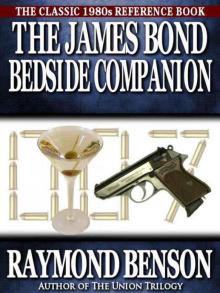 The James Bond Bedside Companion
The James Bond Bedside Companion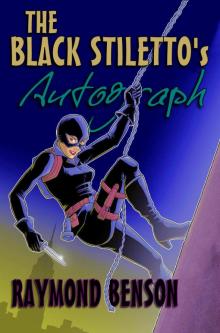 The Black Stiletto's Autograph
The Black Stiletto's Autograph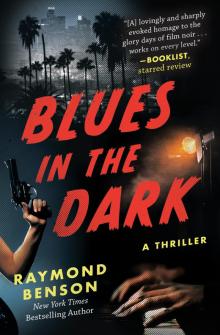 Blues in the Dark
Blues in the Dark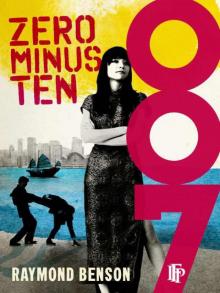 Zero Minus Ten
Zero Minus Ten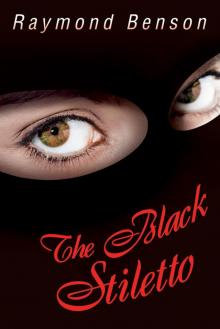 The Black Stiletto
The Black Stiletto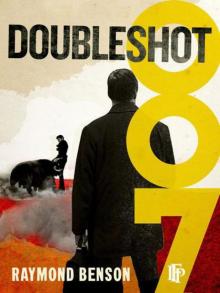 Doubleshot
Doubleshot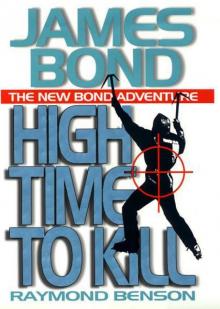 High Time To Kill rbb-3
High Time To Kill rbb-3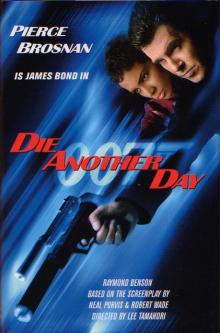 Bond Movies 07 - Die Another Day
Bond Movies 07 - Die Another Day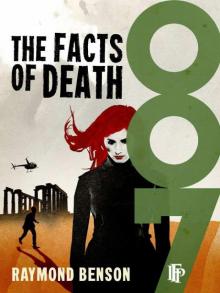 The Facts Of Death
The Facts Of Death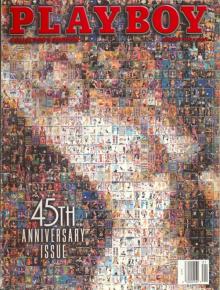 Midsummer Night's Doom
Midsummer Night's Doom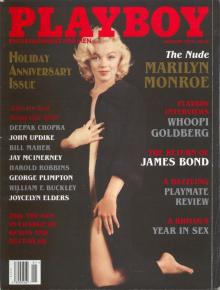 Blast from the Past
Blast from the Past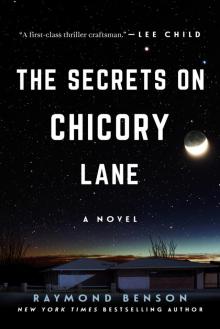 The Secrets on Chicory Lane
The Secrets on Chicory Lane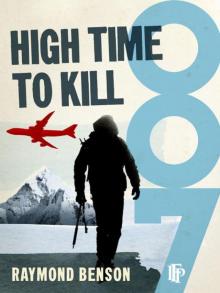 High Time To Kill
High Time To Kill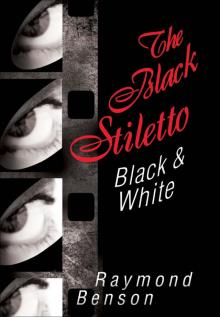 The Black Stiletto: Black & White
The Black Stiletto: Black & White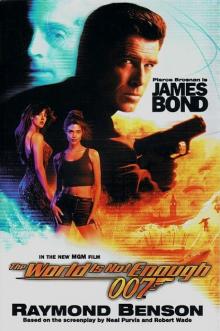 The World Is Not Enough jb-1
The World Is Not Enough jb-1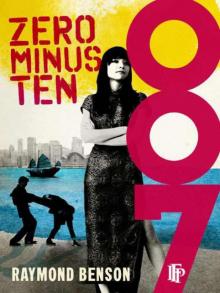 Zero Minus Ten rbb-1
Zero Minus Ten rbb-1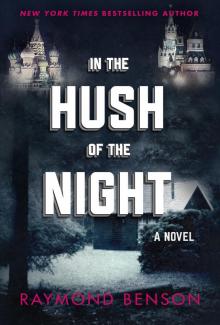 In the Hush of the Night
In the Hush of the Night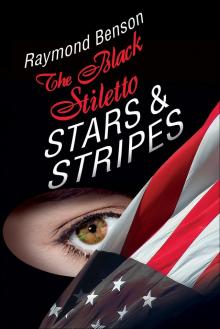 The Black Stiletto: Stars & Stripes
The Black Stiletto: Stars & Stripes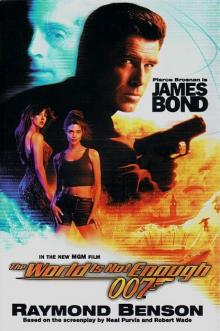 Bond Movies 06 - The World Is Not Enough
Bond Movies 06 - The World Is Not Enough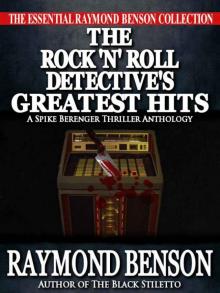 The Rock 'n Roll Detective's Greatest Hits - A Spike Berenger Anthology
The Rock 'n Roll Detective's Greatest Hits - A Spike Berenger Anthology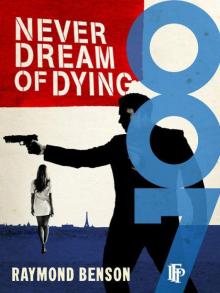 Never Dream Of Dying
Never Dream Of Dying